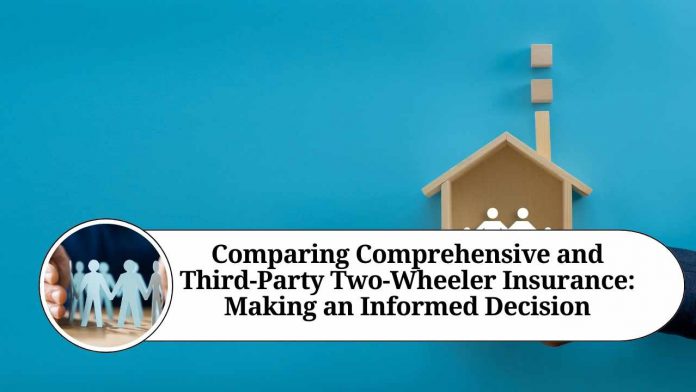Introduction:
When it comes to insuring your two-wheeler, it’s important to make an informed decision. Two-wheeler insurance is mandatory in most countries, as it offers financial protection against potential damages, theft, and liabilities. However, there are different types of insurance policies available, with comprehensive and third-party insurance being the most common. In this blog, we will explore the differences between comprehensive and third-party two-wheeler insurance to help you understand the options and make the right choice for your needs.
Understanding Third-Party Insurance:
Third-party insurance is the minimum legal requirement in many countries. It provides coverage for any damage caused to third parties involved in an accident caused by the insured two-wheeler. This includes coverage for bodily injury, death, and property damage to others. Third-party insurance does not cover any damages to your own vehicle or injuries to yourself. It solely focuses on protecting others from your actions.
Advantages of Third-Party Insurance:
- Legal Compliance: It fulfills the legal requirement of having basic insurance coverage for your two-wheeler.
- Cost-effective: Third-party insurance policies are generally cheaper compared to comprehensive coverage.
- Simplicity: The process of acquiring third-party insurance is usually straightforward and less complicated.
Limitations of Third-Party Insurance:
- Limited Coverage: It does not provide any coverage for damages to your own vehicle or injuries sustained by you in an accident.
- No Theft or Fire Protection: Third-party insurance does not cover theft or fire-related damages to your two-wheeler.
- No Personal Accident Cover: This insurance does not include personal accident coverage for the policyholder.
Understanding Comprehensive Insurance:
Comprehensive insurance offers broader coverage compared to third-party insurance. In addition to providing coverage for third-party liabilities, comprehensive insurance also covers damages to your own two-wheeler due to accidents, theft, fire, natural disasters, and other unforeseen events. It provides a higher level of financial protection, giving you peace of mind on and off the road.
Advantages of Comprehensive Insurance:
- Enhanced Protection: It offers extensive coverage for your two-wheeler, protecting you against a wide range of risks, including accidental damages, theft, fire, and natural disasters.
- Personal Accident Cover: Comprehensive insurance often includes personal accident coverage, providing financial support in case of injury or death of the policyholder.
- Vehicle Resale Value: Opting for comprehensive insurance can help maintain the resale value of your two-wheeler, as potential buyers often prefer vehicles with comprehensive coverage.
Limitations of Comprehensive Insurance:
- Higher Premiums: Comprehensive insurance policies generally have higher premiums compared to third-party insurance due to the increased coverage provided.
- Optional Add-Ons: Some specific add-ons, such as engine protection, zero depreciation, or roadside assistance, may come at an additional cost.
Making the Right Choice: Choosing between comprehensive and third-party insurance depends on your individual circumstances, budget, and risk tolerance. If you have a new or expensive two-wheeler, live in an area prone to theft or natural disasters, or simply prefer the peace of mind of comprehensive coverage, then it may be the right option for you. On the other hand, if you have an older vehicle with a lower market value or want to minimize insurance costs, third-party insurance might be suitable.
Conclusion:
Having the right two-wheeler insurance is crucial to protect yourself, your vehicle, and others on the road. While third-party insurance fulfills the legal requirements, comprehensive insurance offers broader coverage, ensuring financial protection against various risks. Consider your needs, budget, and potential risks before making a decision. Remember, it’s always better to be adequately insured and enjoy the benefits of comprehensive coverage for your two-wheeler.
Other Related Blogs: Section 144B Income Tax Act
Frequently Asked Questions (FAQs)
Q.What is the difference between comprehensive and third-party two-wheeler insurance?
Comprehensive insurance provides coverage for damages to your own two-wheeler in addition to third-party liabilities, while third-party insurance only covers damages to third parties involved in an accident caused by your two-wheeler.
Q.Is comprehensive insurance more expensive than third-party insurance?
Yes, comprehensive insurance generally has higher premiums compared to third-party insurance due to the broader coverage it offers.
Q.Does third-party insurance cover theft or fire damage to my two-wheeler?
No, third-party insurance does not cover theft or fire-related damages to your own two-wheeler. It only provides coverage for damages caused to third parties.
Q.Does comprehensive insurance include personal accident coverage?
Yes, comprehensive insurance often includes personal accident coverage, providing financial support in case of injury or death of the policyholder.
Q.Can I add additional coverage to my comprehensive insurance policy?
Yes, you can enhance your comprehensive insurance coverage by opting for add-ons such as engine protection, zero depreciation, or roadside assistance, which may come at an additional cost.
Q.Is third-party insurance sufficient to fulfill the legal requirements?
Yes, third-party insurance fulfills the minimum legal requirement of having basic insurance coverage for your two-wheeler. However, it does not provide coverage for damages to your own vehicle.
Q.What factors should I consider when choosing between comprehensive and third-party insurance?
Factors to consider include the value of your two-wheeler, your budget, the risk of theft or accidents in your area, and your preference for comprehensive coverage and peace of mind.
Q.Can I switch from third-party to comprehensive insurance or vice versa?
Yes, you can switch between the two types of insurance policies at the time of policy renewal. However, the premium and coverage will be adjusted accordingly.
Q.Will comprehensive insurance help maintain the resale value of my two-wheeler?
Yes, having comprehensive insurance can help maintain the resale value of your two-wheeler, as potential buyers often prefer vehicles with comprehensive coverage.
Q.Is it possible to get comprehensive coverage for an older two-wheeler?
Yes, you can get comprehensive coverage for an older two-wheeler. However, the premium may be influenced by factors such as the age and market value of the vehicle.




















